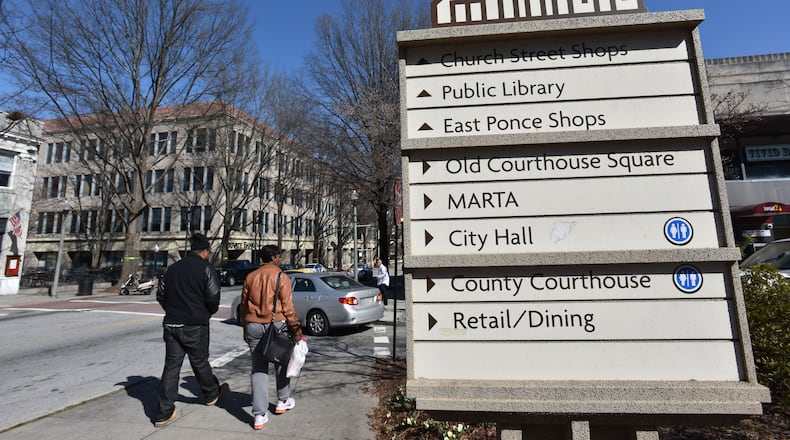Avondale Estates: One of DeKalb's most uniquely designed cities, it was founded in 1924 by George Francis Willis and planned largely using Willis' inspirations from a trip to England, according to the city's website. The city's architecture is modeled after the Tudor‐style of 16th century England, but Stratford‐upon‐Avon, the birthplace of William Shakespeare, is from whence the Avondale Estates name came.
Brookhaven: Chartered officially in 2012, the community has been around much longer. Long enough, in fact, that city officials aren't sure of the exact history of the name. The area that would become the city grew around Capital City Club, a golf course that was originally called Brookhaven Country Club when it opened in 1912, and the Brookhaven Estates neighborhood. Valerie Biggerstaff, who was hired last year for a history project for the city, said the area came to be known as Brookhaven, but it isn't clear where the club and neighborhood got their names.
Chamblee: The city's website says there's "great discussion" about the origin of the name. One story is that it originated from an 1885 petition for the U.S. Postal Service to establish a post office in the area, which was then known as Roswell Junction. Postal officials were concerned the proposed name was too similar to the city of Roswell and then randomly selected the name "Chamblee" from the list of petitioners. The Chamblee selected was a black railroad worker.
Another story has a Chamblee family starting the town.
Clarkston: Originally called "New Siding" after Jake New, a railroad foreman, the city was chartered in 1882. It was named in honor of Colonel W.W. Clark, a Covington lawyer and a director of the Georgia Railroad, according to the city's website.
Decatur: The DeKalb County seat was incorporated in 1823 and was named for Commodore Stephen Decatur, perhaps the most popular American hero of that time, according to the Georgia Encyclopedia. He led daring raids in the wars against the Barbary pirates on the coast of Africa before returning home a hero in 1805.
Doraville: According to dekalbhistory.com, it was named for Dora Jack, the daughter of a local Southern Railway official. According to the city website, it was founded in 1871.
Dunwoody: Georgia.gov says the city's name comes from a misspelling of the Confederate soldier it's intended to honor: Maj. Charles Dunwody. He was the son of John Dunwody, one of the founders of the Roswell Manufacturing Company mills in Roswell. The city wasn't officially chartered until 2008, but the community dates back to the 1800s, according to the Dunwoody Convention Visitors Bureau.
Lithonia: Georgia.gov says the community got its unusual name when, in the 1840s, a teacher combined the Greek words "litho" meaning "rock" and "onia" meaning "place." The east DeKalb area contains an abundance of Gneiss granite, and Stone Mountain is composed largely of a rock called Lithonia gneiss.
Pine Lake: According to georgia.gov, the city established itself in 1937 as a weekend fishing getaway for Atlanta's elite. Asked about the origin of the name, the city didn't offer a theory. But, for what it's worth, the city of roughly 1,000 people is centered around a lake that is surrounded by pine trees.
Stonecrest: The city, which was approved in the Nov. 8 election, covers most of southeast DeKalb, including areas near Lithonia and Stonecrest Mall. Jason Lary, president of the Stonecrest City Alliance, said he chose the name because of the area's history with granite.
Stone Mountain: The small city, established in 1839, encompasses less than two miles, to the west of Stone Mountain Park. It takes its name from its granite dome, the largest exposed granite rock face in North America.
Tucker: The community, which officially was chartered as a city in 2015, has been around for some 125 years. It had been known as Browning's District until 1907 when the Seaboard Line Railway acquired the local railroad and named the town after an officer of the company, Capt. Tucker, according to the Tucker Historical Society.
BONUS:
Atlanta: Some might not know a portion of the state capital is located in DeKalb County. The DeKalb-Fulton line runs along Moreland Avenue, leaving the Edgewood, Kirkwood and East Lake neighborhoods, among others, in DeKalb. Originally named Terminus to mark the end of the rail line, the city's current name is supposedly a feminine version of the word Atlantic, according to Georgia Encyclopedia. The name was first used by John Edgar Thomson, chief engineer of the Georgia Railroad, to designate his railroad's local depot.
About the Author
Keep Reading
The Latest
Featured


